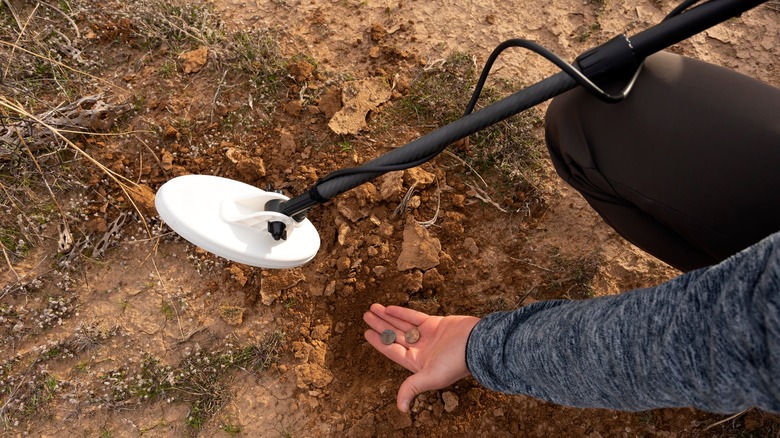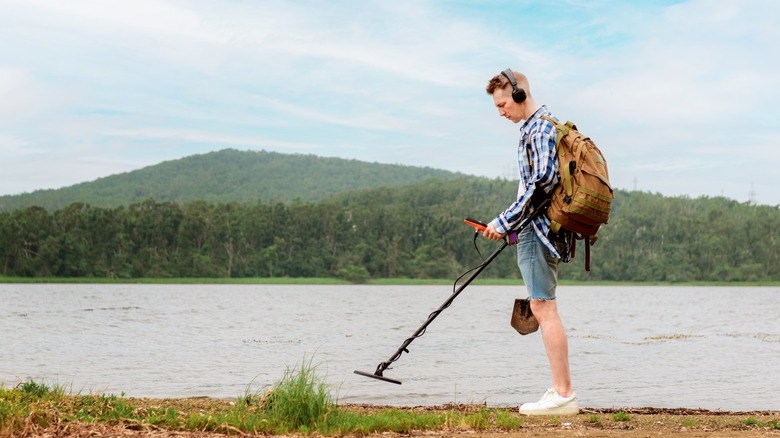Crucial Rules You Need To Know Before Using A Metal Detector On Vacation
You've probably seen people with metal detectors on the beach, sweeping them over the sand with a little beep here and there. Suddenly, they dig something up. Sometimes, it's a lost hair clip, but if luck is with them, it's a diamond ring, a piece of armor, or an ancient sword. It's not the most inexpensive hobby, but with some metal detectors hovering around $150 on Amazon, it's not outrageous. A metal detector and a few digging tools, and you might just find something fascinating.
If scouring the ground for hidden treasures sounds like fun, you might want to try it on your next vacation. What if you were wandering around a beautiful Italian island and found a Roman coin or something? That sounds exciting, but there are some crucial rules that you cannot ignore, or you could find yourself in deep trouble. You could even be breaking the law. To add to this, there are finds that might be dangerous, like unexploded bombs. You could also damage important cultural artifacts. (If you find a historical object, it's possible that you can keep it, but that depends on several factors.)
Don't give up on your hobby dream, however. If you follow certain rules and regulations, you may detect something wonderful. Even if it ends up in a museum, you could make the local paper or website. Here are the things you need to know before you vacation with your metal detector.
Things to know before you begin
If you take a metal detector on vacation, you'll have to check it on your flight. It cannot be a carry-on. The TSA recommends you check with your airline to see if there are specific guidelines. It's also worth checking with any local places that sell detectors to see what advice they have and to get contact information for local authorities.
This is because you usually need permission to use a metal detector. Laws vary widely, depending on the city, state, and country. Note that national parks in the U.S., like this historical park for Civil War buffs, do not allow metal detecting or even carrying a metal detector (per the National Park Service). Others, like this underrated Lake Michigan state park, are more transparent about where you can use one, with designated areas for metal detecting. While your local park might be okay, others might not be. That said, beaches are often your best bet for legal metal detecting ... but you should still check.
For private property, you must get written permission from the owner. Trespassing is illegal, and having a written agreement will save you headaches later, especially if you find something valuable.
It's very important to make sure you're not on a protected site or one with archaeological significance. You may be disturbing cultural heritage or protected plants and animals. Be careful not to interfere with trees and crops, and always fill any holes that you dig and dispose of trash.
What to do if you actually find something
So, what do you do if you find something? It depends on what it is. If you've located modern coins or a ring on the shore, you're probably fine. However, you might uncover something that could have historical or cultural significance. If that's the case, even if you just suspect it, you should report it to the local authorities, a local historian, or a museum. (Research and write down the phone numbers you need before you begin detecting.) Do not move the item. The position it's in or even the soil around it may give archeologists clues about how it fits into history.
As mentioned earlier, sometimes, particularly on battlefield sites or places that have seen war, you may come across unexploded ammo, grenades, or bombs. If you suspect it might be live (and even if you don't), don't touch it. Call the authorities immediately. That also goes for any area that might contain human remains.
There can also be laws about what you discover. For instance, in the U.K., you must report finds, and if they're declared "treasure" (you can find the definition here), they are considered Crown property. In simplest terms, it must be offered to a museum for sale first. If no one bites, you may be given the item to keep or sell it privately. Detecting can be a wonderful hobby, as long as you follow the rules.


